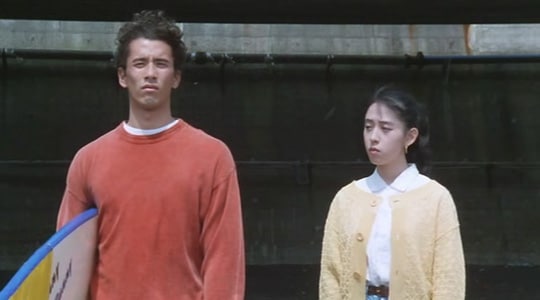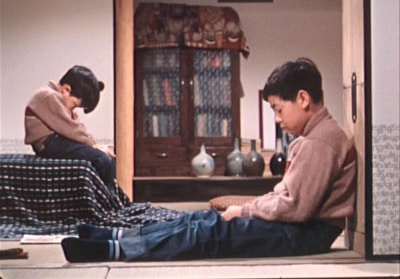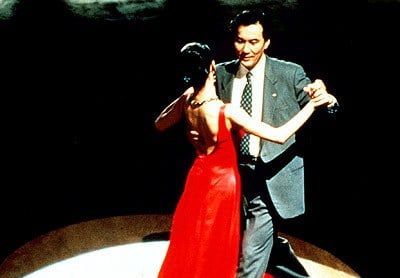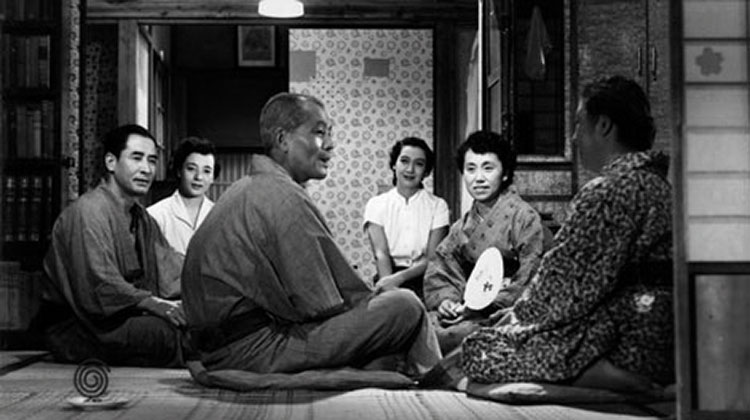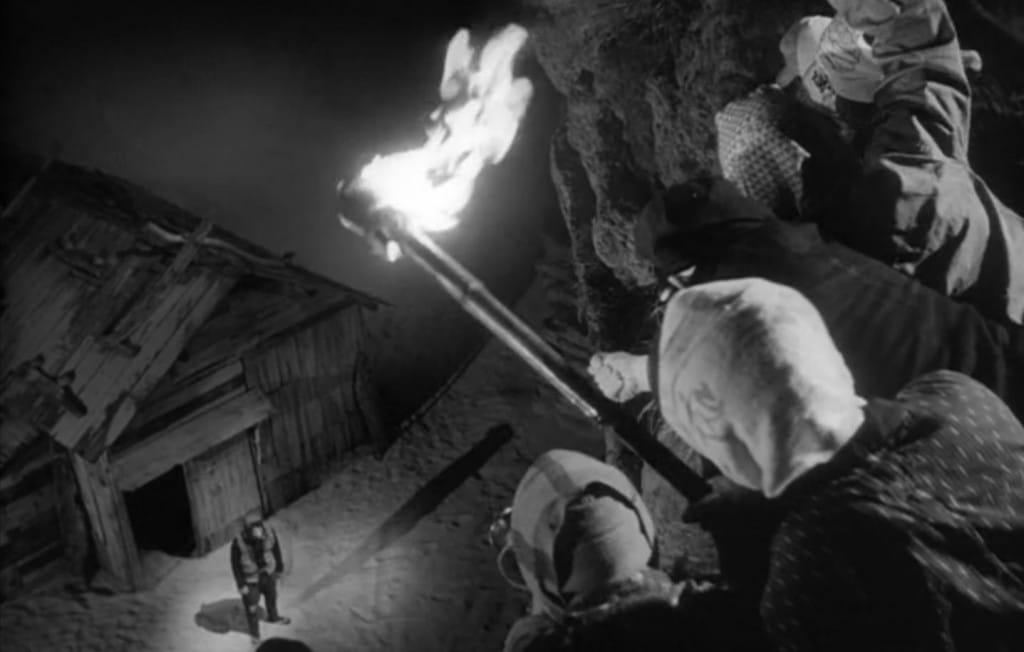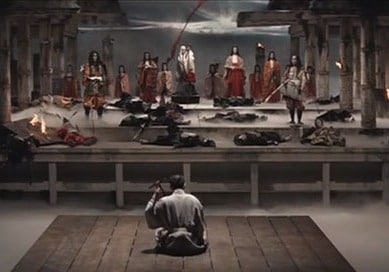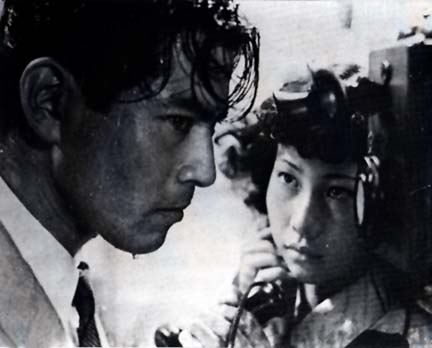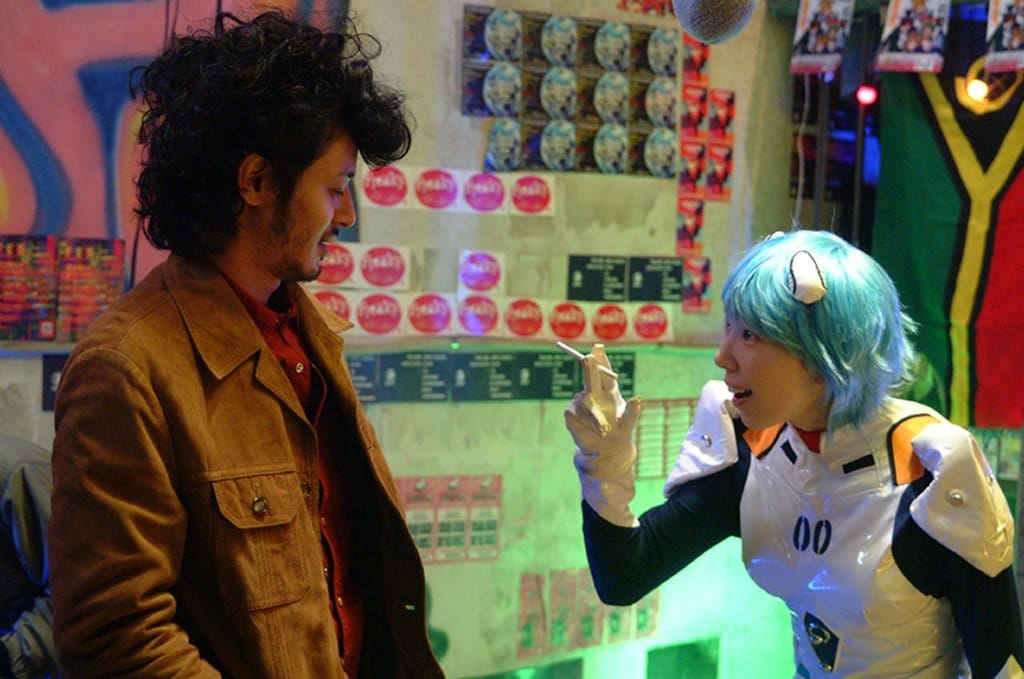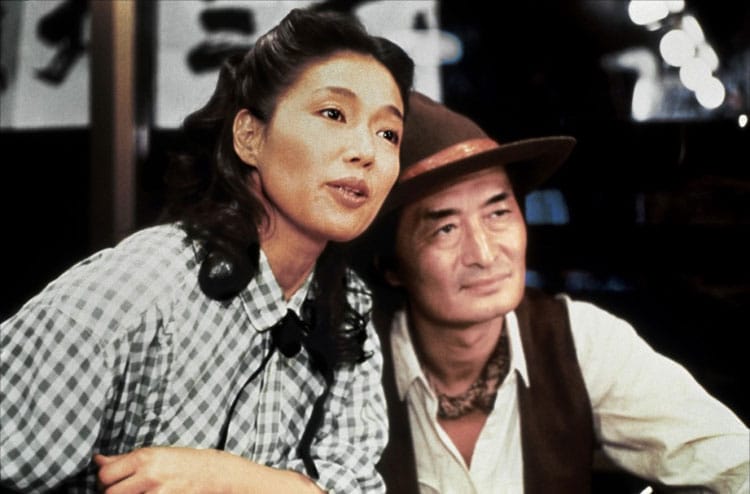
Learn Japanese with Movies: 10 Modern Classics for Japanese Learners
So you already like learning Japanese with dramas.
Another great way to improve your Japanese is to watch Japanese movies.
Here are 10 classic Japanese movies that you can learn the language with, plus some tips on how best to study with movies in general.
Contents
- 10 Japanese Movies Perfect for Learners
- Why Learn Languages Through Movies and Films?
- Why Watch Classic Films?
- How to Study Japanese through Movies
- How to Improve Your Speaking with Movies
Download: This blog post is available as a convenient and portable PDF that you can take anywhere. Click here to get a copy. (Download)
10 Japanese Movies Perfect for Learners
1. “Tampopo” (タンポポ)

Where to watch: YouTube, Prime Video, Apple TV+
“Tampopo” is a classic Japanese comedy that tells the story of a run-down ramen shop’s revitalization. In addition to the language, it gives you some pretty good insights into Japanese culture and especially its food obsession.
The film’s publicity jokingly called it the world’s first ramen western, a Japanese take on the American “spaghetti” Western.
2. “A Scene at the Sea” (あの夏、いちばん静かな海。)
Where to watch: YouTube, Blu-ray and DVD
“A Scene at the Sea” revolves around a deaf couple, so there’s not a great deal of dialog and when there is talking, it’s easy to follow.
Although written and directed by Beat Kitano, who is known more for his violent gangster movies, “A Scene at the Sea” has no shoot-outs or violence. It’s about a deaf garbage collector who is determined to learn to surf.
3. “Good Morning” (お早よう)
Where to watch: Tubi, Prime Video, Apple TV+
“Good Morning” is a Japanese film classic by Yasuhiro Ozu. It’s a comedy about two young brothers who take a vow of silence in protest of their father’s refusal to buy a TV.
It gives a unique look at a rapidly changing Japan and does it in a humorous way. Since many of the film’s characters are children, the Japanese is fairly easy to understand. The movie’s simple plot also makes it an easy one to watch.
4. “Shall We Dance?” (Shall We ダンス?)
Where to watch: YouTube, Internet Archive
“Shall We Dance?” is a classic with a lighthearted story that’s easy to follow. The film is a romantic comedy about a man who becomes infatuated with a dance teacher and gets roped into taking ballroom dance classes.
It doesn’t have any heavy dialects or particularly difficult Japanese. This is the original version of the film, not the 2004 American remake with Richard Gere.
5. “Godzilla” (ゴジラ)
Where to watch: Tubi, Prime Video, Apple TV+
You’ve probably seen “Godzilla” dubbed awkwardly into English. Well, the original Japanese version is great for sharpening your Japanese skills.
The plot isn’t too difficult to understand (giant radioactive monster destroys city) and there are long stretches where there is no dialog except Godzilla roaring. Plus, you can learn some handy vocabulary in case your city is ever besieged by a giant monster. The cheesiness factor also makes this a fun one.
6. “Tokyo Story” (東京物語)
Where to watch: Tubi, Prime Video, Apple TV+
“Tokyo Story” is a 1950s movie about a traditional Japanese couple who visit their young, busy children in modern Tokyo. In addition to helping with your Japanese, it offers a look at the generation gap in Japan that occurred after World War 2.
Although it’s fairly slow-paced, much of the action happens off-camera. You only know what’s going on through the dialog. I’d save this one for advanced study, but it’s a really good movie and has topped a number of greatest classic film lists.
7. “Woman in the Dunes” (砂の女)
Where to watch: YouTube, Prime Video, Apple TV+
“Woman in the Dunes” is another film that can be found on many greatest movie lists. Although it’s not a horror film, it’s pretty eerie and disturbing. It’s about a guy collecting insects who gets trapped by some weird villagers in a sunken house, where he’s doomed to shovel the encroaching sand out for all of eternity.
Or at least that’s what I think it’s about. I’m pretty sure it’s a metaphor for the human condition. But you can watch it to study your Japanese and not worry about the philosophical implications too much. I found the dialog to be fairly easy to follow and pretty slow-paced.
8. “Kwaidan” (怪談)
Where to watch: Internet Archive, Prime Video, Apple TV+
One more creepy film and then I promise we’ll move on to something more light-hearted. “Kwaidan” (literally translated to “Ghost Stories”) is an anthology horror film from the 60s with four spooky stories.
It might not be the type of horror you’re used to, but I don’t recommend watching it late at night. The dialog is slow and spare, but because of the subject matter and because it uses slightly old-fashioned Japanese, it may be a bit tough to follow.
9. “Stray Dog” (野良犬)
This is hailed by many as the first buddy cop movie, but don’t let that stop you from checking it out. In “Stray Dog,” Toshiro Mifune plays a rookie cop whose gun gets nabbed. He spends the movie running around in the post-war Tokyo underground with a seasoned older cop.
It’s a film noir police drama by Akira Kurosawa and, like many of his great movies, it’s overshadowed by his samurai films. “Stray Dog” is fairly fast-paced so you may have to stop it to understand the Japanese, but the plot will hold your interest.
10. “Adrift in Tokyo” (転々)
Where to watch: YouTube
“Adrift in Tokyo” is about a guy who can’t repay the money he borrowed from the yakuza, so a loan shark says he’ll cancel the debt if the guy walks around Tokyo with him and then turns himself in to the police. So, the film is basically the two walking around Tokyo talking.
There’s a great deal of very natural dialog and you also get to see quite a bit of the city. I don’t know if this qualifies as a “classic” since it’s more recent, but it’s a great movie for studying Japanese and I’m sure it will be a classic in the years to come.
Why Learn Languages Through Movies and Films?
There are several advantages to learning a language through movies rather than textbooks.
First of all, you’re learning real, natural Japanese the way it’s actually spoken. Or at least the way it’s spoken in movies, but that’s real enough. You get to see the language in context, which leads to a deeper understanding of it. This includes gestures, facial expressions, conversational etiquette and social customs that are also part of a language.
Movies also give you a wide variety of speakers to listen to. You’re exposed to different accents, registers, styles and ways of speaking. You may also get different sets of vocabulary, depending on what kind of film you’re watching.
You can learn about Japanese culture. If you really want to communicate and connect with Japanese speakers, then it really helps to know more about Japanese culture. Movies can definitely help with this.
The wonders of our technological age make it easier than ever to learn through movies. Thanks to the miracle of streaming, you have total control over the viewing experience. You can start and stop wherever you’d like and you can have subtitles if you need them so that you’re not completely lost.
And finally, movies are just simply good fun. While you’re practicing listening comprehension and expanding your vocabulary, you’re also enjoying a good flick. When learning is fun, you’re naturally more motivated to keep studying!
Why Watch Classic Films?
There are all kinds of movies or TV shows you can watch to study Japanese. It’s always best to choose a genre or subject matter that you like, whether it’s old samurai movies or modern-day anime.
I recommend watching classics and there are a few reasons why.
First of all, they tend to be good; that’s why they’re classics. But secondly and more importantly, I think classics give you more of an insight into Japanese culture. That’s another reason why they’re classics. They go beyond the run-of-the-mill formulaic plot and present ideas and opinions in addition to a story.
How to Study Japanese through Movies
There are a number of different ways to go about studying with movies.
You may want to go with subtitles the first time you watch a film so that you’re not completely lost within the first five minutes. Movies aren’t as much fun to watch when you’re confused about what’s going on.
After a first viewing with subtitles, you can watch the movie again without them or break it up into chunks. For example, you can watch a scene at a time, going back and playing it until you have a handle on what the characters are saying. Turning off the subtitles might not be an option on some streaming sites, so make sure you choose the best viewing option for you.
Perhaps the most effective (but most intense) way to study is to fully digest and review every word. I recommend this for intermediate or advanced Japanese learners. Otherwise, you’re going to be stopping the movie a lot. This involves looking up new words, getting a solid grasp of how they’re used, and regularly reviewing them, either in your notebook or through a flashcard app.
The disadvantage of this method is that it requires a ton of discipline. Whenever you encounter a new word, you’ll have to identify the sound and look it up in your dictionary. You’ll spend a lot of time and energy organizing your learning, rather than actually learning. If you’d like to be more efficient, you can use FluentU, which was designed to address exactly this problem.
It naturally and gradually eases you into learning Japanese language and culture. You’ll learn real Japanese as it’s spoken in real life.
Just take a look at the wide variety of authentic video content available in the program. Here’s a small sample:

You’ll discover tons of new Japanese vocabulary through these great clips.
Don’t worry about your skill level being an issue when it comes to understanding the language. FluentU makes native Japanese videos approachable through interactive transcripts.

Tap on any word to look it up instantly.
You’ll see definitions, in-context usage examples and helpful illustrations. Simply tap “add” to send interesting vocabulary words to your personal vocab list for later review.

FluentU even uses a learning program which adapts to your specific needs to turn every video into a language learning lesson and get you to actively practice your newly-learned language skills.

Start using the FluentU website on your computer or tablet or, better yet, download the FluentU app from the iTunes or Google Play store. Click here to take advantage of our current sale! (Expires at the end of this month.)
If you’re going to study through movies, commit to it. Spend a little time each day reviewing and watching more. It doesn’t really matter if you watch your movies all the way until the end. As in all things language learning, what’s most important is that you have a habit that you can stick to.
How to Improve Your Speaking with Movies
Obviously, your listening comprehension is going to get better from watching movies. But ideally, you want your speaking to improve as well. When I studied Japanese through movies, I wrote down each new word or phrase and drilled them. For phrases, I would put my own words into the phrase to practice using it.
Another way to improve your speaking is to try shadowing. This means saying the word or phrase along with the character in the film. This is a real challenge if you’re not a fluent Japanese speaker, but it’s one way to help you remember words and phrases. Shadowing turns the passive viewing experience into something interactive. You’ll also entertain everybody around you when they see you talking to the TV.
For me, it sometimes helped to spend a bit of time researching phrases. An expression like yoroshiku onegaishimasu can have different meanings and uses. There isn’t an exact word in English like it. This is why it’s important to understand the social context. I paid especially close attention to words like this when I was watching movies.
So there you have it! Watch these movies several times with the tips we’ve shared and you’ll be sure to improve your Japanese skills. Good luck!
Download: This blog post is available as a convenient and portable PDF that you can take anywhere. Click here to get a copy. (Download)
